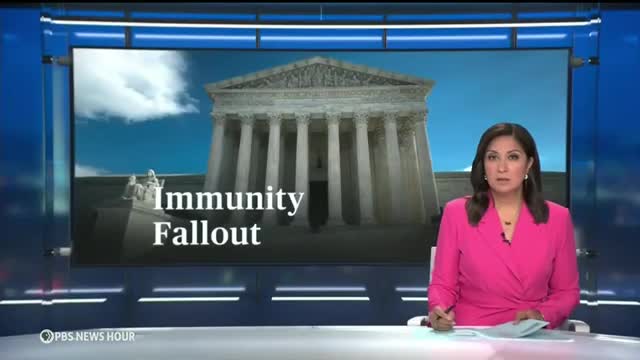Supreme Court ruling reshapes presidential power dynamics

This article was created by AI summarizing key points discussed. AI makes mistakes, so for full details and context, please refer to the video of the full meeting. Please report any errors so we can fix them. Report an error »

The recent Supreme Court ruling regarding former President Donald Trump's legal immunity has sparked significant debate about the future of presidential power and accountability in the United States. Historian Heather Cox Richardson, a professor at Boston College, emphasized that this decision represents a fundamental shift in the longstanding principle that no one, including the president, is above the law.
Richardson pointed out that the framers of the Constitution were clear in their intent to prevent any executive from acting without legal constraints. Historical precedents, such as the resignation of President Richard Nixon and subsequent pardons, have reinforced the notion that presidents can be held accountable for their actions. However, the Supreme Court's latest ruling introduces a distinction between \"official\" and \"unofficial\" acts, which Richardson argues could lead to unprecedented legal interpretations that allow presidents to evade prosecution for actions taken in their official capacity.
This ruling raises concerns about the potential for abuse of power, as it sets a precedent that could enable future presidents to justify illegal actions as part of their official duties. Richardson warned that this could undermine the checks and balances that are essential to the American constitutional system, likening the situation to authoritarian regimes where leaders operate without judicial oversight.
The implications of this decision are profound, as it challenges the foundational belief in equal treatment under the law and raises questions about the future of democratic governance in the United States. As the nation grapples with these developments, the conversation around presidential accountability and the rule of law is more critical than ever.
Richardson pointed out that the framers of the Constitution were clear in their intent to prevent any executive from acting without legal constraints. Historical precedents, such as the resignation of President Richard Nixon and subsequent pardons, have reinforced the notion that presidents can be held accountable for their actions. However, the Supreme Court's latest ruling introduces a distinction between \"official\" and \"unofficial\" acts, which Richardson argues could lead to unprecedented legal interpretations that allow presidents to evade prosecution for actions taken in their official capacity.
This ruling raises concerns about the potential for abuse of power, as it sets a precedent that could enable future presidents to justify illegal actions as part of their official duties. Richardson warned that this could undermine the checks and balances that are essential to the American constitutional system, likening the situation to authoritarian regimes where leaders operate without judicial oversight.
The implications of this decision are profound, as it challenges the foundational belief in equal treatment under the law and raises questions about the future of democratic governance in the United States. As the nation grapples with these developments, the conversation around presidential accountability and the rule of law is more critical than ever.
View full meeting
This article is based on a recent meeting—watch the full video and explore the complete transcript for deeper insights into the discussion.
View full meeting